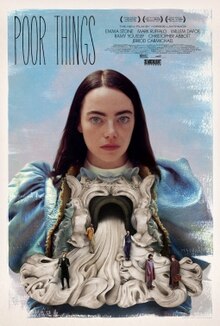In the summer of 2023, Greta Gerwig's "Barbie" took the world by storm to the tune of $1.4 billion at the box office. Crafting a feminist tale surrounding the candy-colored fantasy world of the beloved doll, it critiqued the narrow ideals of beauty and womanhood perpetuated by the beloved doll's enduring popularity. The film rightfully earned audience and critical acclaim upon release but a few months later, its brilliance was arguably eclipsed by an even more subversive character study of a woman rejecting societal expectations - Yorgos Lanthimos' "Poor Things".
Set during the Victorian era, "Poor Things" is the story of a strange young woman named Bella Baxter (played by Emma Stone). When we meet her she lives with a scientist she calls God (a perfectly grotesque Willem Dafoe). God is short for Godwin, which proves to be an apt nickname considering the origins of their relationship. Indeed, we soon learn the reason for her peculiar behavior and social awkwardness, as it's revealed that her current persona is the result of one of Godwin's bizarre experiments. Bella was previously a pregnant woman who committed suicide, but was then found by Godwin, who proceeded to replace her brain with that of her unborn child. Now a blank slate, the new Bella Baxter must now learn about herself and her place in the world. With her child's curiosity as her guide, she thus sets forth on an global adventure upon the invitation of a charismatic lawyer, much to the chagrin of her protective father figure.
The film's absurdist premise is immediately striking, as Stone's fully committs to a characterization that would be almost offensive if her backstory weren't later revealed. Indeed, as described by Ramy Youssef's Max exclaims when he first meets her, she is a "very pretty retard." But from these clumsy beginnings, Stone charts Bella's accelerated development into adulthood brilliantly, with gradual changes in her physicality and speech. And as Bella undergoes her sexual awakening and intellectual development, Lanthimos' astute screenplay explores philosophical questions surrounding free will, gender relations and the underlying cruelty of polite society.
As Bella becomes increasingly enlightened, the film's feminist manifesto does sometimes feel like it's conveying Lanthimos' worldly voice rather than Bella's. But the preachiness is thankfully offset by the film's genuine playfulness and humor, most notably from Mark Ruffalo's hilariously flustered portrayal of Duncan Wedderburn as Bella's frustrated lover. Meanwhile, the cinematography is incredible, transitioning from its initial black-and-white to thereafter exploding with deeply saturated colors and expressive production design when Bella ventures out into the world.
"Poor Things" is truly reflective of the singular artistic visison of Yorgos Lanthimos. It's weird, provocative, funny and ultimately, surprisingly sweet. It's easily one of 2023's best films.
| Tweet |

/cdn.vox-cdn.com/uploads/chorus_image/image/72943315/PT_Atsushi_Nishijima_20211105_00054_87aExBJ.0.jpg)






No comments:
Post a Comment